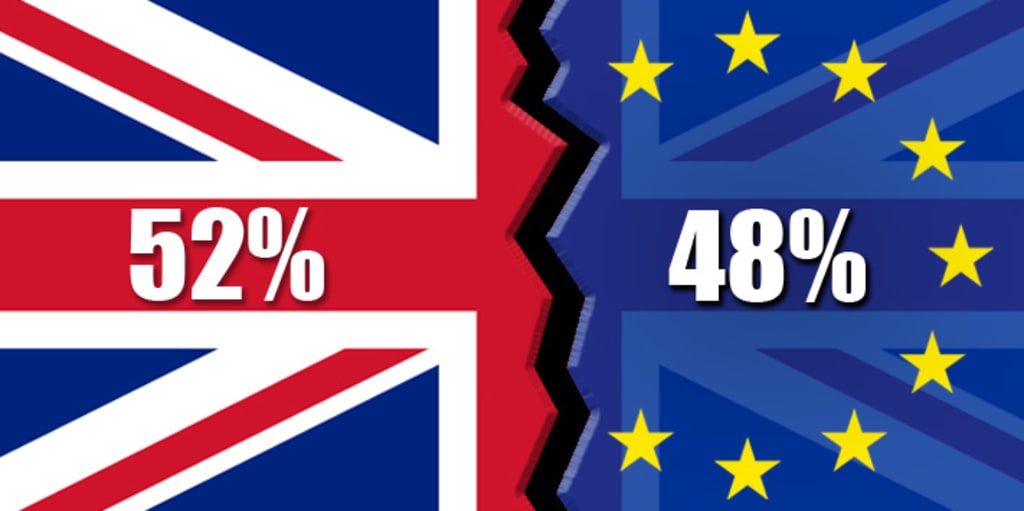3 Reasons the People Voted Brexit
Why did the people of Britain vote to leave the EU?

Although there were advantages and disadvantages on both sides I would like to explore the figure that truly suggests the real reason people voted leave on Thursday, 23rd of June 2016.
For many Britains, it was a head vs heart issue: it was a case of being emotionally drawn to the EU and the rest of Europe but thinking that they would be better off outside of it. Here are some of the many reasons why the majority of the British people voted to leave.
Legislations and Control
The many remain voters the thought was that we need to co-operate with our neighbours, for leave voters though the EU was never about co-operation with each other. Many argued that if the EU were simply a common market no one would have a problem with it. What makes the EU not just a common market, however, is the fact that it provides its member states with legislation, usually without consulting or getting the full approval of its members. For leave voters, the EU is a controlling organisation. If any conflict of legislation or ideas between Brussels and any other non-EU parliament, then Brussels would always take priority over its member states.
For the majority of leave voters, the EU had acquired nation-only attributes: a president, a foreign minister, citizenship and passport, the ability to make treaties, criminal justice system, a constitution and a flag. This was unacceptable and for some leave voters, it was as if we were being absorbed into a nation rather than an organisation.
The EU is not a Free-Trade Zone
The EU is not a free-trade zone; it is a customs union.
Free-trade areas remove tariffs and boundaries to goods moving in those areas. These zones tend to make participants wealthier as they don't have to pay import tax on certain goods that are part of the agreement and in the zone of free trade.
Customs Unions, on the other hand, is a group of states that have agreed to charge the same import duties and to usually allow free-trade between themselves. This blocks participating countries from creating their own trade deals with countries outside the customs union.
We take the EU as the example of the customs union: Britain want to set up a new trade deal with Canada, they agree on 5% import duty but as Britain is part of the EU that doesn't matter as the EU set the import duty from any country outside of it to 20% - that's just an example.
You can see how and why this may encourage voters to vote leave as it would allow Britain to negotiate its own trade deals. Presumably, leave voters would prefer a situation like Switzerland's; enjoys free trade with the EU and can make separate trade deals with China, or Canada, or any other country.
How the EU deals with Crisis
First of all the EU was set up as a trade organisation but a played a much larger role in European Politics outside of trade than it should have. It has made trade unrelated legislations to help deal with these crises that we have experienced. One such crisis is the Refugee Crisis in which the EU attempted to bring Turkey into its fold, not for free trade but to control its border with Syria, in order to deal with the refugees coming into Europe that way, this almost seems imperialistic.
Some of the propositions made by EU parliament members are encouraging a seeming merging of nations that people of most EU countries do not want: the Belgian commissioner Marianne Thyssen has proposed a 'social union' - i.e she want the welfare systems of EU countries to merge - this would hand over control of Britains welfare system to the EU meaning the EU would control food stamps, unemployment compensation, benefits, housing assistance, child care assistance and health care - our NHS is struggling as it is. A different proposition by Jean-Claude Junker was a European Army, which the was called 'a strategic necessity'. As I said before about the EU becoming like a nation state.
You have to remember these aren't some policies by some think tank filled madness and small children playing politician, these are actually policies proposed by the people in Brussels who run the EU. So you can see why the majority of Brits don't trust the EU in making their laws and legislations.
Conclusion
These were just some of the reasons that the majority of Britons wanted to leave. Whether you agree or not both sides of the debate were spread through fear-mongering and lies.
But the People have made the decision. So we'll be saying Goodbye to the EU in a couple more years - if things go well and the people in Brussels don't act like little children and try to punish us.
~Puckey
About the Creator
Cameron Puckey
Amateur Writer and Philosopher, travelling the world with my voice, mind and laptop.






Comments
There are no comments for this story
Be the first to respond and start the conversation.